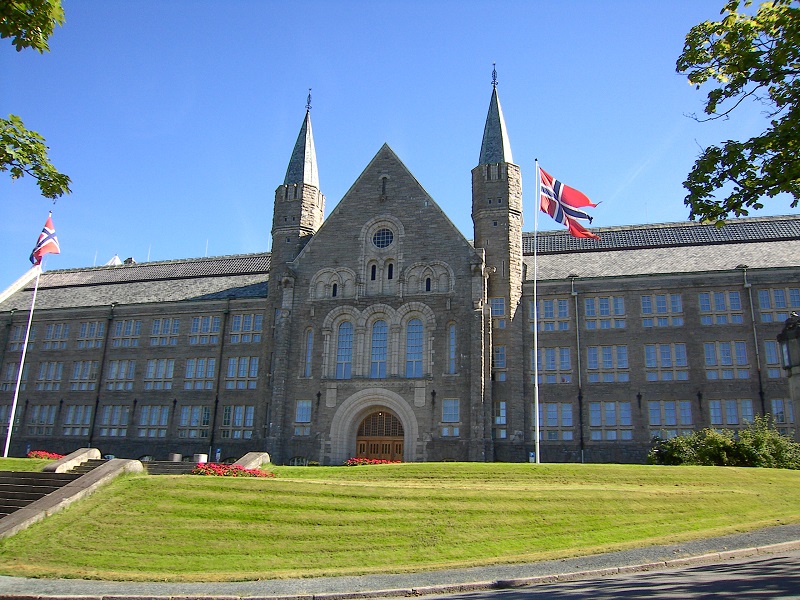
Norwegian University of Science and Technology
The Norwegian University of Science and Technology traces its roots back to the Norwegian Institute of Technology,
Over the decades, the Norwegian University of Science and Technology and its predecessor institutions have played a pivotal role in Norway’s industrialization and technological development.
The university has a strong tradition of interdisciplinary collaboration, dating back to the merger of several specialized schools in 1996. The has maintained a commitment to excellence in education and research, while also adapting to societal changes and emerging technologies.
Norwegian University of Science and Technology is one of the largest universities in Norway, with around 42,000 students and 7,000 employees as of 2023, This university was established in 1996 through a merger of the University of Trondheim, the Norwegian Institute of Technology, the Trondheim Economics University, and the Trondheim Museum, The Norwegian University of Science and Technology is focused on technology, science, and engineering, with popular programs in computer science, electrical engineering, mechanical engineering, and materials science. It is consistently ranked as one of the top universities in Norway and among the leading technical universities in Europe
Research
Research areas at the Norwegian University of Science and Technology include renewable energy, marine technology, biotechnology, and ICT. The university works closely with the Norwegian industry and strongly focuses on innovation and technology transfer, Notable alumni include Norwegian Prime Minister Jonas Gahr Støre and several prominent scientists and engineers. The University is Norway’s largest university in terms of research activity, with an annual research budget of over 3 billion.
Key research areas include clean energy, sustainability, health, and digital transformation, and operates numerous research centers and institutes, including the world-leading marine technology center SINTEF Ocean, The University has a strong focus on commercializing research through spin-off companies and technology transfer.
Research Strengths and Focus Areas
Norwegian University of Science and Technology has established research excellence in several strategic priority areas:
Energy and environment (renewable energy, carbon capture, sustainable materials)
Health and welfare (biomedical engineering, public health, healthcare technology)
Oceans and coastal areas (marine technology, aquaculture, coastal zone management)
Digitalization and new technologies (AI, robotics, cybersecurity, Industry 4.0)
The university’s research is often interdisciplinary, drawing on expertise across its various faculties.
Research Organization and Funding
Norwegian University of Science and Technology
research activities are organized across its 8 faculties and numerous research centers and institutes. Key research institutes include SINTEF, one of Europe’s largest independent research organizations, and the Norwegian University of Science and Technology Discovery Centre. Funding comes from a variety of sources, including the Research Council of Norway, the European Union, industry partners, and philanthropic organizations. In 2022, NTNU had a research budget of over 3 billion NOK (approximately USD 320 million).
Collaborative Partnerships
NTNU collaborates extensively with other Norwegian and international universities, as well as public and private sector partners.
The university has strategic partnerships with leading companies like Equinor, Kongsberg, and Siemens to drive innovation and technology transfer.
NTNU also participates in numerous international research networks and consortia, leveraging global expertise and resources.
Research Infrastructure and Support
NTNU operates world-class research facilities and laboratories, including specialized centers for areas like renewable energy, marine technology, and materials science.
The university provides extensive support services for researchers, including grant writing assistance, technology transfer guidance, and access to high-performance computing infrastructure.
NTNU places a strong emphasis on fostering an environment that attracts and retains top research tale
Campus facilities and Student life
NTNU offers extensive student support services, including career counseling, mental health resources, and academic advising. The university has modern, environmentally friendly student housing, sports facilities, and cultural venues.
Student organizations cover a wide range of interests, from coding clubs to outdoor adventure groups.NTNU emphasizes hands-on, project-based learning, with many opportunities for internships and real-world learning experiences.NTNU has multiple campuses located across Norway, with the main campus in Trondheim. The Trondheim campus covers an area of over 1.5 square kilometers and includes more than 100 buildings.
Major facilities on the Trondheim campus include:
Extensive laboratory spaces for engineering, science, and medical research
Specialized centers and institutes (e.g., Gemini Centre for Renewable Energy, Marine Technology Centre)
Modern student housing, dining halls, and recreational facilities
The NTNU Library, one of the largest university libraries in Scandinavia
The university offers a wide range of courses and degree programs taught in English, spanning various academic disciplines and makes the university an attractive destination for international students seeking high-quality education in Norway.
Admission requirements
The admission requirements for international students applying to study at the Norwegian University of Science and Technology vary depending on the level of study (undergraduate, graduate, or doctoral) and the specific program. Here’s a general overview of the key admission requirements:
Undergraduate :
- Completed secondary/high school education equivalent to the Norwegian upper secondary school diploma
- Minimum grade/GPA requirements (varies by program)
- Proficiency in English demonstrated through standardized test scores (e.g., TOEFL, IELTS)
- Submission of application, transcripts, and other required documents
Graduate:
- Completed bachelor’s degree or equivalent from an accredited institution
- Minimum grade/GPA requirements (varies by program)
- Proficiency in English demonstrated through standardized test scores (e.g., TOEFL, IELTS)
- Relevant work experience may be required for some programs
- Submission of applications, transcripts, recommendation letters, and other required documents
Doctoral (Ph.D.)
- Completed master’s degree or equivalent from an accredited institution
- Strong academic record and research experience
- Proficiency in English demonstrated through standardized test scores (e.g., TOEFL, IELTS)
- Research proposal and/or project description
- Identification of a potential supervisor at NTNU
- Submission of applications, transcripts, recommendation letters, and other required documents


